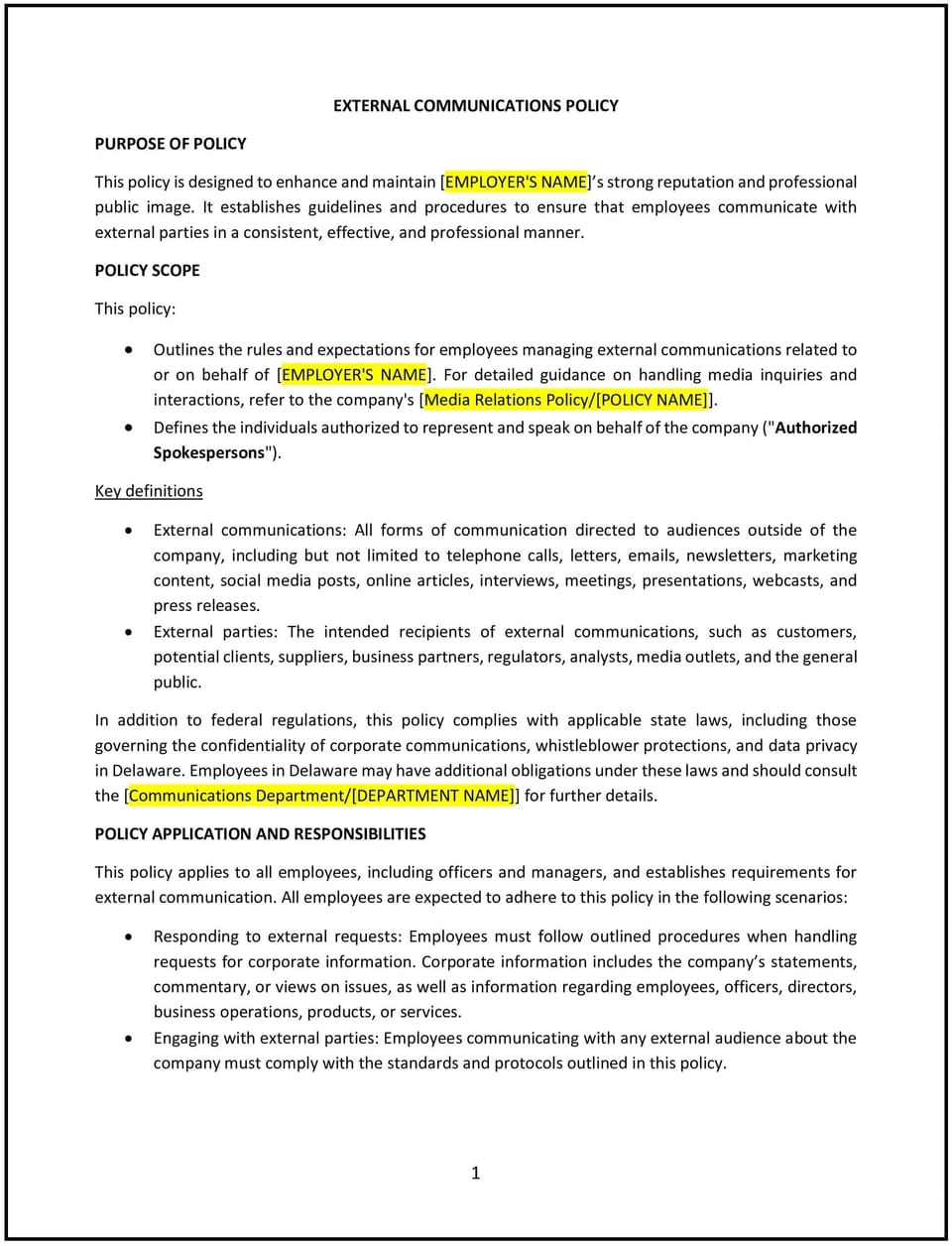External communications policy (Delaware): Free template

External communications policy (Delaware)
An external communications policy helps Delaware businesses manage how employees interact with external stakeholders, such as clients, media, and the public. This policy outlines guidelines for consistent messaging, appropriate communication channels, and handling sensitive information to safeguard the company’s reputation and ensure compliance with Delaware laws.
By implementing this policy, businesses can promote professionalism, protect confidential information, and maintain a consistent brand voice.
How to use this external communications policy (Delaware)
- Define authorized spokespersons: Specify which employees are permitted to speak on behalf of the company to external parties, such as media or clients.
- Establish approval processes: Require prior approval for public statements, press releases, or other communications representing the company.
- Outline communication channels: Provide guidelines for using official communication platforms, such as email, social media, or public statements.
- Protect confidentiality: Emphasize the importance of safeguarding proprietary and sensitive information in external communications.
- Manage crisis communications: Include protocols for addressing emergencies or public relations crises to ensure timely and appropriate responses.
- Train employees: Offer training on external communication best practices and the company’s expectations for representing the brand.
Benefits of using this external communications policy (Delaware)
This policy offers several benefits for Delaware businesses:
- Maintains brand consistency: Ensures all external communications align with the company’s values, tone, and messaging.
- Protects reputation: Reduces the risk of misinformation or inappropriate statements damaging the company’s public image.
- Safeguards confidential information: Minimizes the risk of unauthorized disclosures that could harm the business or its stakeholders.
- Enhances professionalism: Provides clear guidelines for engaging with external audiences effectively and respectfully.
- Promotes legal compliance: Aligns with Delaware regulations and industry standards for external communications and information sharing.
Tips for using this external communications policy (Delaware)
- Communicate the policy clearly: Ensure employees understand the guidelines for external communications and their role in maintaining the company’s reputation.
- Centralize media inquiries: Direct all media-related questions to designated spokespersons to ensure consistent and accurate messaging.
- Monitor social media use: Provide specific guidelines for employees’ use of personal and professional social media accounts when discussing the company.
- Prepare for crises: Develop a crisis communications plan that aligns with this policy to address emergencies or reputational risks effectively.
- Review regularly: Update the policy to reflect changes in Delaware laws, business needs, or communication platforms.
Q: Why is an external communications policy important for my business?
A: This policy ensures that all external communications align with the company’s brand, protect confidential information, and reduce the risk of reputational damage or legal issues.
Q: Who should handle media inquiries under this policy?
A: Only authorized spokespersons, as designated in the policy, should handle media inquiries. This ensures consistent and accurate messaging that represents the company appropriately.
Q: How can my business safeguard sensitive information in external communications?
A: The policy should emphasize strict confidentiality and provide guidelines for employees to avoid sharing proprietary or sensitive information in emails, social media, or public statements.
Q: What should employees do if they are approached by media or other external stakeholders?
A: Employees should refer all inquiries to the designated spokesperson or public relations team, as outlined in the policy, to ensure consistent handling.
Q: How often should this policy be reviewed?
A: This policy should be reviewed annually or when changes in Delaware laws, communication platforms, or business needs occur to ensure it remains effective and compliant.
This article contains general legal information and does not contain legal advice. Cobrief is not a law firm or a substitute for an attorney or law firm. The law is complex and changes often. For legal advice, please ask a lawyer.


